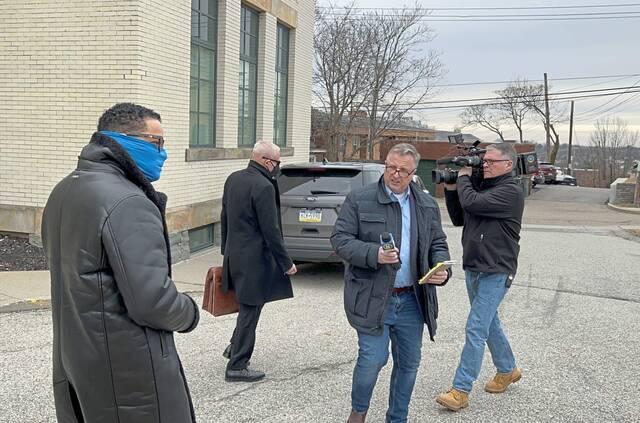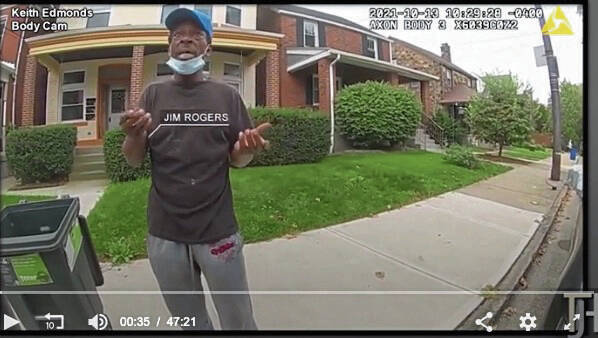The Pittsburgh police officer fired for repeatedly using his Taser on a homeless man who died the next day has been reinstated.
Keith Edmonds, who was terminated on March 24, 2022, appealed that firing through the city’s police union.
On Friday, a neutral arbitrator found that Edmonds should be reinstated, said Robert Swartzwelder, the police union president.
Under the arbitrator’s finding, Edmonds is to be reinstated with full back pay and benefits. He is to suffer no loss of pay or discipline, Swartzwelder said.
He said he could not comment on the decision or the details of the case.
Edmonds’ attorney, Michael Machen, praised the ruling.
“The arbitration process is seen as the most unbiased, thorough process, and the positive decision for Mr. Edmonds speaks volumes.”
Mayor Ed Gainey said in a statement the finding was “deeply disappointing.”.
“Officer Edmonds himself testified that he violated the policies of the City of Pittsburgh, however this award adopts a new standard that says that even an admission of guilt by the officer isn’t enough to warrant disciplinary action,” the mayor said.
“Our city deserves a police bureau that prioritizes treating every resident with dignity and respect, and we deserve a system where our officers can be held accountable for their actions.”
The city is reviewing its options, a spokeswoman said.
Among them would be a potential appeal to Allegheny County Common Pleas Court.
In December, City Solicitor Krysia Kubiak said at a news conference regarding an $8 million settlement of the wrongful death suit stemming from the incident, that the city was “confident in the position that Mr. Rogers died because of the actions of the officers.”
Edmonds was dispatched to Harriet Street in Bloomfield on Oct. 13, 2021, for a report of a possibly stolen bike. The officer encountered Jim Rogers, a homeless Black man, and began asking him questions and patting him down.
Rogers became upset when Edmonds removed his wallet from his pants pocket, causing Edmonds to react forcefully. In less than a minute, the officer was using his Taser.
Video of the incident released several weeks ago show that Edmonds deployed his Taser 10 times.
A City of Pittsburgh Critical Incident Review Board found that nine officers on the scene that day failed to properly perform their jobs. Some, the board found, ignored Rogers’ repeated pleas for medical help, others did not properly supervise those in their command.
The review board also found that Rogers did not present a threat to Edmonds, that the officer gave a series of “rapid, conflicting commands to Rogers,” and chose to use his Taser instead of attempting to handcuff the man.
The review board report revealed that there were at least 10 electrical shocks over three minutes and 15 seconds.
The board said Edmonds’ “poor tactics and decision-making skills escalated rather than de-escalated this incident. Officer Edmonds created the jeopardy in which he found himself.”
The report found that Edmonds violated a number of Pittsburgh police policies, including those dealing with use of force, warrantless search and seizure, standards of conduct and handling of a prisoner.
He was among nine officers disciplined in early 2022.
Of that group, two retired, four were fired but reinstated, including Edmonds, and three others were suspended. One of the suspensions remains in arbitration.
Swartzwelder previously called the executive summary of the Critical Incident Review Board “a hit piece.
“They had an agenda. If they were right, the city wouldn’t have settled seven of nine disciplinary cases at substantially less discipline than was recommended.”
He also said that when taken together, all of the video footage from the scene that day, as well as Rogers’ Taser log, show Edmonds did not shock Rogers 10 times.
“Just because you have 10 presses of the trigger doesn’t mean you had 10 full contacts,” Swartzwelder previously told TribLIVE. “If Mr. Rogers was hit 10 times with a Taser, he would have never gotten up off the ground.”
The fact that Edmonds could retain his job and net back pay after being involved in Rogers’ death “highlights the need for change at the state level when it comes to arbitration,” said Brandi Fisher, founder and president of the Pittsburgh-based Alliance for Police Accountability.
“We hold young people accountable for violence, for emotional acts where they take lives … but we don’t hold people who are trained to be responsible and reliable accountable for the same thing,” Fisher said. “As long as we allow officers to continue to conduct themselves this way, we’re going to keep being in this situation.”
Fisher on Friday criticized Allegheny County District Attorney Stephen A. Zappala Jr. for not filing criminal charges against Edmonds for Rogers’ death. She also defended Gainey and said action is needed in Harrisburg to change the arbitration process.
“If I’m the mayor and I am saying, ‘I don’t want this officer on my force,’ that word should matter,” Fisher said. “I can’t imagine being an employer and having no control over who works for you … there is no other profession where this happens.”
“We need to ask ourselves, ‘Who are the people that make these decisions?” she added. “‘And how can we change the law?’”
Elizabeth Pittinger, who heads Pittsburgh’s Citizen Police Review Board, said the city should have to explain its decision to the public.
“When you make decisions before you have all the facts, it’s politically expedient, but a day of reckoning always comes,” Pittinger said.
But Daylon A. Davis, president of the Pittsburgh branch of NAACP, defended Gainey, saying he “moved quickly in dismissing all officers involved.” Davis stressed that an arbitration process leading to Edmonds’ reinstatement “is deeply troubling.”
“It not only erodes trust within our community but also upholds a system that neglects accountability, especially among those tasked with protecting and serving,” Davis said.
Like Fisher, he criticized Zappala for not prosecuting Edmonds in Rogers’ death.
“We will not rest until those responsible are held accountable for their actions and until meaningful change is achieved to prevent such tragedies from occurring in the future,” he added.
Zappala’s office did not return a message seeking comment.
He has previously said that the case had been turned over to other agencies to review.











